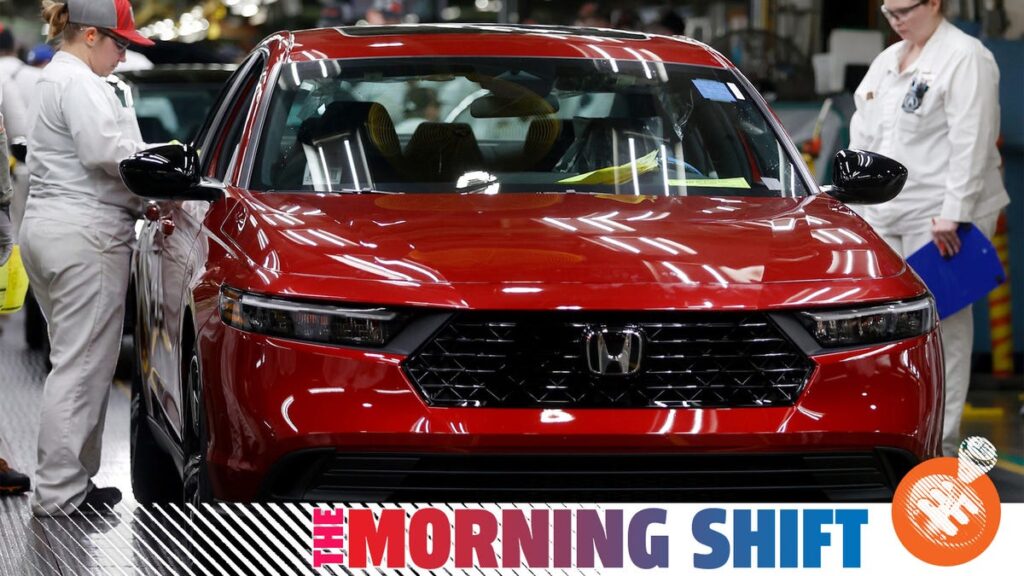Honda's Continued Chip Woes Will Hit North America Hardest

Image: Honda
Honda’s setting up for a somewhat downbeat end to the fiscal year, General Motors has a chipmaker to call its own, for now, and Volvo is the latest automaker that’s said it won’t play Tesla’s games. All that and more in this Friday edition of The Morning Shift for February 10, 2023.
1st Gear: Bigger Cars, More Chips
Honda has cut its sales output for the current fiscal year, which ends March 31, by a quarter of a million units. If the Japanese automaker manages to hit that target, it’ll mean a 5.4 percent reduction in volume compared to the previous year — a bit of a bummer for Honda, as the brand actually started 2022 expecting sales to increase year-over-year, not backslide.
As you’d guess, Honda believes trouble securing silicon is holding it back, and, like every other automaker, it seems to believe the second half of 2023 will be smoother than the first in that regard. But what’s interesting about the company’s projection is that its North American business stands to be hit the hardest by supply chain snags. From Automotive News:
Speaking at Honda’s quarterly earnings announcement on Friday, Operating Executive Eiji Fujimura said the supply of semiconductors is expected to pick up, but only in the second half of the coming fiscal year. That corresponds to a time frame of October 2023 to March 2024.
“I think we will see better procurement of semiconductors around that time,” Fujimura said, while announcing a 22 percent increase in quarterly operating profit.
“We are starting to see the situation bottom out.”
Honda cut 25,000 vehicles from its North American outlook. It now expects to sell 1.23 million vehicles in the critical market through March 31, down from the originally planned 1.25 million.
The forecast for Asia took the biggest hit, dropping by 220,000 vehicles to 1.86 million.
Honda kept its guidance for Europe, its smallest market, unchanged at 85,000 units.
G/O Media may get a commission

Grow those luscious locks back
This proprietary, prescription-grade topical Finasteride is proven to regrow hair in just a few months.
The reason is simple: Honda sells the biggest cars here that it does anywhere in the world, and bigger cars need more chips. But it’s not all bad. Even though the company moved fewer cars than it planned over the previous 10 months, it doesn’t expect to underperform its profit expectations thanks to the global economy.
The Japanese yen’s dramatic weakening against the U.S. dollar and other currencies added 100.5 billion yen ($762.1 million) to the bottom line in the October-December quarter. The forex [foreign exchange] gains offset sliding sales and rising expenses to drive Honda to a quarterly profit increase.
Worldwide sales retreated 12 percent to 955,000 vehicles in the three-month period. Results were pulled down by a 24 percent plunge in Asia, where sales dropped to 443,000 units.
Despite the weakening sales outlook, Honda still managed to keep its profit outlooks unchanged for the fiscal year to March 31, because of the offsetting effect of a weaker yen.
2nd Gear: GM Claims GlobalFoundries
If you run an automobile manufacturer and you haven’t shaken hands with a chipmaker to secure dedicated capacity for your products, what are you even doing? Car and semiconductor companies are shacking up left and right and General Motors and GlobalFoundries are the latest, having agreed to a three-year deal that will see GM reserve the company’s upstate New York fab, Reuters reports:
GlobalFoundries Chief Executive Tom Caulfield told Reuters he believes supporting U.S. manufacturing makes the company competitive when seeking some of that funding.
“This is the automaker going right to the manufacturing foundry, reserving the capacity for their needs, making the appropriate co-investments with that foundry so that the best economics take place,” Caulfield said.
Caulfield said the GM capacity would be installed in an existing factory upstate New York, but declined to give specifics around how much of the factory’s output would be dedicated to the automaker.
GM told Reuters that it is working to streamline how many unique kinds of chips are in its cars. But it is securing capacity for its suppliers to have the chips made because the overall number of chips is expected to rise.
“We see our semiconductor requirements more than doubling over the next several years as vehicles become technology platforms,” Doug Parks, GM head of global product development, said in a statement.
Now you may recall GlobalFoundries and Ford had a deal of their own at one point in 2021. It’s unclear whether that agreement is still ongoing. But considering GM enjoyed a very successful 2022 and Ford most certainly didn’t — in part due to a lack of chips — this comes across as the Blue Oval’s biggest rival hitting it where it hurts.
3rd Gear: Speaking of Ford
Ford CEO Jim Farley has been in the news quite a bit lately. He was more than “frustrated” on an earnings call after Ford undershot its projected pretax profits by a billion dollars and ended the fourth quarter with net income almost 90 percent lower compared to the same period last year. He pointed fingers at engineers, and donned overalls and drove some race cars with Daniel Ricciardo. On Thursday he relayed a vague initiative to “simplify performance metrics” for employees, as reported by The Wall Street Journal.
Chief Executive Jim Farley said in a virtual town-hall meeting Thursday morning that he was working to simplify goals and performance metrics for employees, according to people who were present.
Mr. Farley said at the meeting that tackling broader problems at Ford, such as supply-chain management and poor quality, can’t be done at only one level, and there need to be clearer ways to help individual workers understand what they need to do to contribute to the car maker’s overarching objectives, the people said.
A company spokeswoman said these global town-hall meetings are held monthly and that this gathering was meant to focus the Ford team on recentering its objectives for 2023.
Supply-chain problems and structural inefficiencies have continued to hamper the company’s progress, executives have said. Mr. Farley expressed the need to deepen its cost-cutting actions on an earnings call last week, saying that inefficiencies in certain departments are making the company slower than its competitors.
For the record, these are the same employees who developed cars so good that Farley said they “masked dysfunctionality” and “deeply entrenched issues in [the brand’s] industrial system.” Big ups to Ford staff: You knocked literally every single product announcement in recent memory out of the park, even though you never understood what you “needed to do,” in the big boss’ words. That, and that alone — not chips, incessant cost-cutting at the expense of long-term reliability or dependence on lowest-bidder parts — is definitely the problem.
4th Gear: South Korea Goes Off on Diesel Cheaters
Audi, BMW, Mercedes-Benz, and Volkswagen: They’re all in trouble in South Korea for allegedly colluding to rig diesel emissions testing, according to Reuters:
South Korea’s anti-trust regulator said on Thursday it would impose a combined fine of 42.3 billion won ($33.48 million) on three German automakers for colluding to curb emissions-cleaning technology for their diesel cars.
Mercedes-Benz, BMW, Volkswagen and Audi were involved in collusion that reduced competition and restricted consumer choice, the Korea Fair Trade Commission (KFTC) said in a statement.
Mercedes-Benz was fined 20.7 billion won, BMW 15.7 billion won and Audi 6 billion won, the regulator said, adding that Volkswagen was not fined because it did not earn revenue relevant to the issue.
Mercedes-Benz said the company had cooperated fully with the KFTC and “will not have to pay any fine,” citing the outcome of a similar probe by the European Commission.
It’s kind of unfathomable that automakers are still up to these tricks after, you know, everything. If one thing’s clear, though, this is just going to keep happening as long as diesel cars remain in production.
5th Gear: Volvo Isn’t Here for an EV Price War
There has been a price war recently with EVs, or at least that is what “the media” is calling it, though I’m not sure it is a price war more than it is price jockeying, because no one seems to know how EV tax credits are going to shake out. Anyway, according to Automotive News, Volvo doesn’t plan to participate in whatever it is.
The automaker is seeing robust demand for its full-electric models, Chief Financial Officer Johan Ekdahl said in an interview Thursday.
“We feel comfortable in our pricing strategy and will not engage in price wars,” Ekdahl said.
[…]
Only if prices for raw materials were to normalize would the automaker controlled by China’s Zhejiang Geely Holding Group consider adjusting prices, CEO Jim Rowan said in the same interview. “It’s not driven by demand,” he said.
“The demand is really high for all our car, especially our BEVs [battery-electric vehicles],” Rowan previously told Automotive News Europe.
This is Volvo’s general stance in life, slightly smug and self-satisfied and happy not playing the volume game, and I respect it. — Erik Shilling
Reverse: Happy Ralph Nader Day
On this day in 1966 — 57 years ago — via History.com:
On February 10, 1966, Ralph Nader, a young lawyer and the author of the groundbreaking book “Unsafe at Any Speed: The Designed-In Dangers of the American Automobile,” testifies before Congress for the first time about unsafe practices in the auto industry.
By the mid-1960s, U.S. automakers were still largely unregulated. Nader’s book, which was published in November 1965, accused car companies of designing vehicles with an emphasis on style and power at the expense of consumer safety. One chapter of “Unsafe at Any Speed” focused on handling problems with the Chevrolet Corvair, a car produced by auto giant General Motors. Shortly after Nader’s congressional testimony, the news media reported that Nader had been followed by detectives. It was later determined that starting in early February 1966, GM sent investigators to spy on Nader and look into his personal life in an effort to discredit him. Nader sued GM for harassment and invasion of privacy and won a settlement. The publicity surrounding GM’s actions helped make “Unsafe at Any Speed” a best-seller and turn Ralph Nader a household name.
Neutral: Toyota Chickened Out
Image: Toyota
This is the new Toyota Grand Highlander, but I really think they ought to have called it the “Sienna Cross.” It’d be second only to “Taurus X” as the funniest car name of all time.



